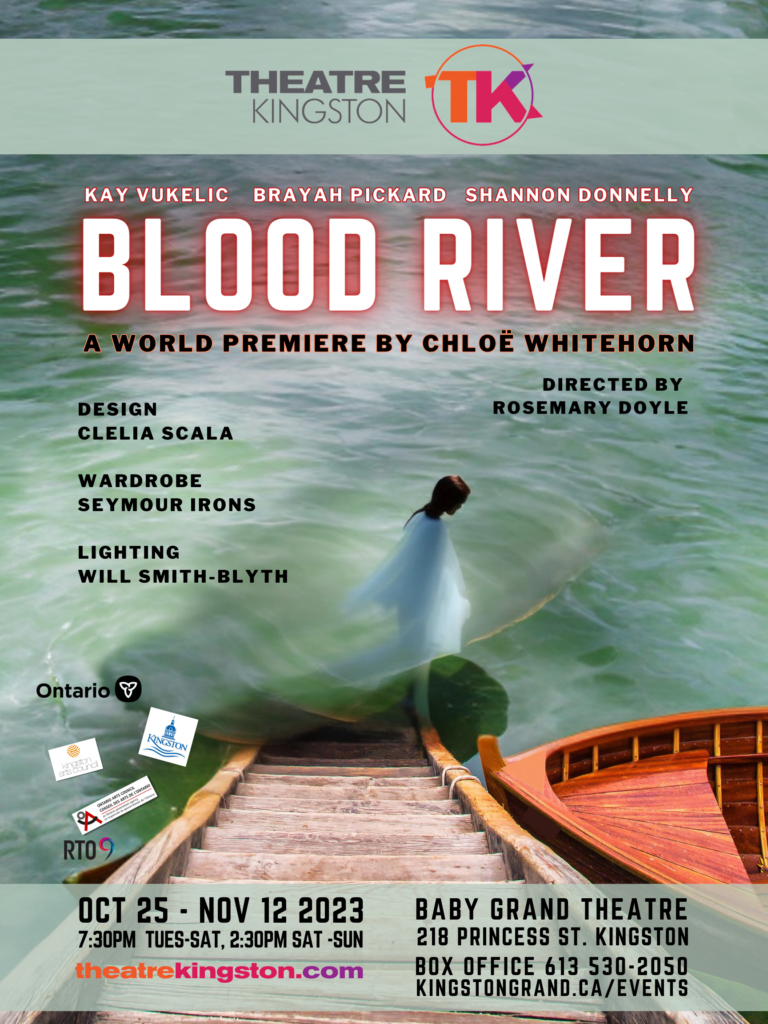It’s Not About Abortion: Chloë Whitehorn on Writing ‘Blood River’

Chloë Whitehorn’s new play, Blood River, is set in a world where Roe v. Wade has been overturned and abortion is illegal. The play follows three women—a mother, a daughter, and a reproductive rights activist—as they navigate life where the lines between law and religion have become dangerously blurred.
This interview has been edited for length and clarity.
So yes, okay. It is about abortion. But to call Blood River an ‘abortion play’, or even an ‘issue play’, would be to grossly oversimplify the many layers that Whitehorn has woven into it. “It’s a digression from what I normally write—tragic love stories… It’s a story about three women and the impact of other people’s decisions on their lives.”
A graduate of Queen’s University’s theatre program, Whitehorn is drawn to examining taboo moralities and tragic love in her writing. “I was always the taboo topic person, even as a kid.” She recalls moments at the dinner table where her mother would try to initiate innocuous conversations: How was your day? If you were a tree, what kind of tree would you be? “And I was like, ‘What do you think about abortion?’ It’s the exchange of ideas, that’s why we’re sitting together eating. Otherwise, it’s just listening to each other chew, right? That’s just gross.”
After moving her family back to Canada from the southern United States, Whitehorn met up with Theatre Kingston’s artistic director, Rosemary Doyle. “I told her the story of how we moved back. We were up [in Canada] visiting my in-laws right after Roe v. Wade got overturned—which, when that happened, I literally just stood in front of the TV crying. So we were on the train passing through small towns, going, ‘This looks cute. What’s the real estate like? Can we move here?’”
Hearing about Whitehorn’s experience living in South Carolina, Doyle suggested that she write a play about it. Whitehorn agreed, and Theatre Kingston commissioned her to write Blood River, which opens at the Baby Grand Theatre on October 25th.
To find a way into such an enormous topic, Whitehorn took a character-driven approach. “Diane is Cybelle’s mother, and Karen is Diane’s friend from high school.” While Karen puts her life at risk for women’s autonomy and Cybelle questions her conservative religious upbringing, Diane must reckon with the choices she’s made in raising her daughter. “ The [friendship] is just as important as the mother-daughter relationship. And how women care for each other, how they affect each other, how their interactions change each other.”
Death and grief loom large in Whitehorn’s writing, and Blood River is no exception. Karen’s name is an allusion to Charon, the ferryman in ancient Greek mythology who rows the dead across the river Styx. It’s not all mythology—Whitehorn draws from personal experiences, too: “I stole from my life for this play. The opening line of the play is, ‘I was holding my mother’s hand when she died.’ And that’s where we start on the journey of it. So it’s not just about abortion. There’s also mothers and daughters, and life and death and all the stuff in between.”
Even the abortion debate isn’t really about abortion. “It’s about control,” says Whitehorn. “Making abortion illegal is not about abortion. Criminalizing it is a tool to disenfranchise women and create a reason to either imprison or to kill them, indirectly, by denying them the healthcare that they need. It creates economic issues, hardships, insecurities, evictions, debt, bankruptcy. And women who are denied abortions are often more likely to stay with violent partners. So there’s all these other layers.”
Writing from multiple perspectives on this topic proved to be challenging. “I mean, I obviously have my own take on it. But I think I tried—not to be neutral, I can’t be neutral—but to at least show more than one perspective, how people might come at things from a different point of view.” She drew from her experience living in South Carolina. “Being down there when [the 2016 election] happened, it was eye-opening… In order to just exist, you sort of have to try and see other people’s perspectives, even if you think they’re wrong. So the characters sort of came from the people I met down there as well.”
Whitehorn is excited to see the cast bring Blood River to life under Doyle’s direction. “She is fabulous. Even just watching her during the auditions, how she directed actors—it was like a masterclass in acting… She really is diving into the emotions and the script. There’s this line about the river rocking someone, cradling them… She’s like, ‘Listen to these words. These are very maternal words. Find it there.’”
The process has been intense, but the results are worthwhile. “From what I can tell, it’s hard-hitting, and the actors feel emotionally drained after every rehearsal, just digging into it. It’s heavy stuff, it’s dark, but they’re still trying to find humor and light in it. I’m hoping the audience leaves, not with a sense of dread, but with a hope of what we can do to change things.”
She hopes that audiences will come with an open mind and be ready to think deeply. “It’s not escapism, popcorn movie stuff. You have to actually engage, which I think is the point of theatre. Otherwise, there wouldn’t be a live audience. It’s not just people putting on a show that you just watch—you need to engage with it in order to really get any meaning out of it.”
Theatre Kingston’s production of ‘Blood River’ plays at the Baby Grand Theatre from October 25th to November 12th, 2023. Tickets and more information can be found here. To learn more about Chloë Whitehorn and her work, visit her website.
Resources relating to sexual and reproductive health in Kingston include KFL&A Public Health and the Sexual Health Resource Centre.
This article was edited on December 1st, 2023 to update formatting.